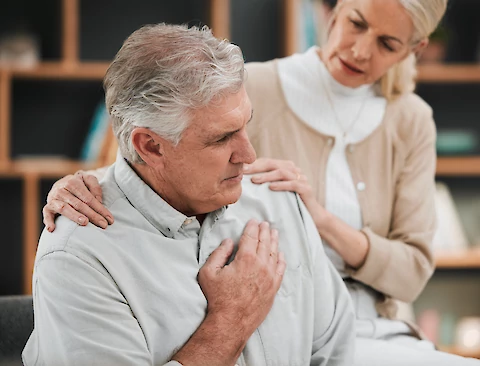
We recognize February as American Heart Month. The importance of heart health warrants a critical discussion, particularly concerning senior citizens. With our senior loved ones at higher risk for heart disease, caregivers need to stay educated and be well-prepared for any emergencies that might develop.
This article empowers you with an action-oriented, step-by-step guide detailing what to do if a senior in your care experiences a heart attack. We focus on the rapid recognition of a heart attack and the swift contact of emergency services, as every second counts. We also stress the importance of a proactive approach, encouraging you to engage with the senior's doctor to create a tailored, detailed action plan. Developing a plan ensures you have precise medical advice and a clear understanding of how best to manage seniors’ unique needs. Effective preparedness could save a life.
Heart Attacks in Seniors
A heart attack occurs when the blood flow to a part of the heart is blocked, usually by a blood clot. This blockage can damage or destroy part of the heart muscle. The signs and symptoms of a heart attack in seniors may significantly differ from those in younger people. Seniors may experience less obvious symptoms, such as fatigue, shortness of breath, and even bouts of confusion, making it essential to recognize and act on these quickly.
Recognizing a Heart Attack
Identifying a heart attack in its early stages can dramatically improve outcomes. Common symptoms in seniors include chest discomfort, pain spreading to the left arm or shoulder, shortness of breath, light-headedness, cold sweat, nausea, or sudden, unexplained fatigue. While these symptoms can also indicate other conditions, it's better to err on the side of caution when dealing with potential heart attacks.
Immediate Actions to Take
If a senior displays signs of a heart attack, the first and most crucial step is to call 911 immediately. Inform the operator that you suspect a heart attack and provide as much detail as possible. This includes any visible symptoms, the time when symptoms began, and any known existing heart conditions.
While waiting for emergency services, keep the senior calm and comfortable. Encourage them to sit down and rest. Do not make them lie down or move around unless directed by a medical professional. Administer prescribed heart medications if advised by healthcare providers.
Creating a Personalized Plan With a Doctor
Proactivity is vital in managing heart health. Working with a senior's doctor to create a personalized plan will best prepare you for this emergency. The plan can include:
- Recognizing the senior's specific heart attack symptoms.
- Knowing where to locate their medications.
- Understanding any dosages they might need in an emergency.
Ensure this plan is up-to-date and easily accessible. Share it with other caregivers or family members who may also need to act in an emergency. Review the plan frequently and adjust it according to the senior's changing needs.
We Can Help
Recognizing a heart attack promptly and effectively responding is critical in caring for seniors. It’s vital to know the symptoms, take action, and implement a detailed, personalized plan that addresses the unique needs of the senior in your care. By collaborating with their doctor, you can make sure you're well-prepared for a potential heart-related emergency.
If you reside in Waxhaw, Monroe, Concord, Kannapolis, or Salisbury and seek support for your senior family member, don't hesitate to contact us at Senior Helpers Waxhaw-Monroe. We would love to discuss our services for seniors and their caregivers, such as Chronic Disease Care and Respite Care.